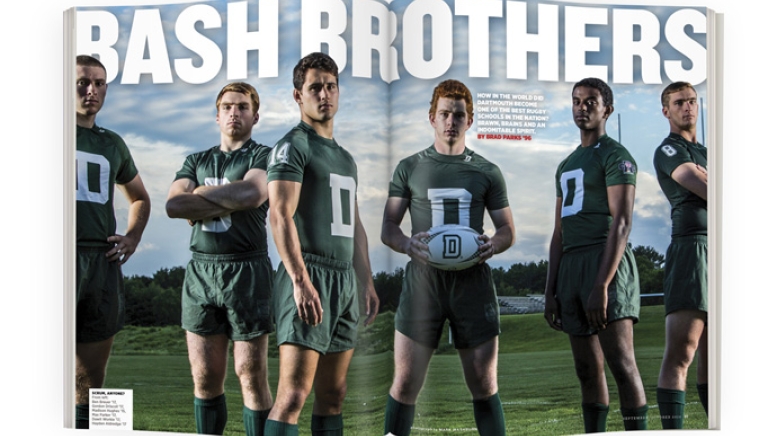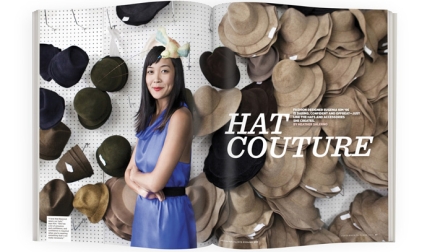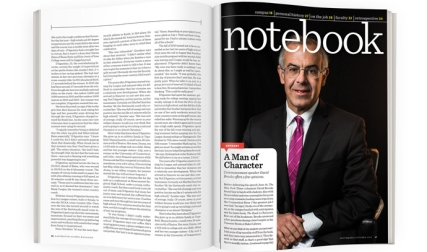The unlikely story of what transformed the men’s rugby team from a collection of fun-loving reprobates into Dartmouth’s most successful sports program in the last 20 years begins with three redheads.
In the late summer of 1996, the first redhead, Kevin Whitcher ’99, had set up a table in the Hopkins Center with the second redhead, Mark Oldham ’99, a Brit nicknamed “Rugby School” because he was a graduate of the famous English prep school after which the sport was named. This was as the class of 2000 was just arriving on campus, and the two were making like carnival barkers, aggressively recruiting any guy who looked like he might be athletic enough to help their team.
Amidst the slipstream of bewildered freshmen filtering past the Hinman boxes, there emerged the third redhead, a lanky fellow wearing a high school rugby national championship T-shirt.
“We said, ‘Hey, come over here. You have to play with us,’ ” Whitcher recalls. “And he was like, ‘No, no, I’m done with rugby. That was a high school thing for me.’ Well, we weren’t going to take no for an answer.”
They got him to agree to come out to a practice. There, Alex Magleby ’00, who had won that national title with Utah’s Highland High School, playing on a team that later included the likes of future NFL star Haloti Ngata, didn’t take long to make an impression.
“About 30 seconds into the first practice I pulled him aside and said, ‘Okay, kid, what’s your deal?’ ” says Wayne Young ’72, the paterfamilias of Dartmouth rugby. “He was just head and shoulders above the other freshmen.”
And, it turns out, he was only getting started.
At that point in its evolution, Dartmouth rugby was a club known as much for its social proclivities as its on-field results. Its raucous Thursday night meetings often lasted well into Friday morning. Its Saturday games featured a keg on the sidelines. Its international tours were notorious for their high jinks.
The reputation was fitting for a club that had been founded in the early 1950s as what Young fondly calls “a spring break scam.” Legend has it, he says, that the Bermuda Tourism Authority had announced it would subsidize travel for participants in its rugby tournament. So a motley assortment of Dartmouth football, lacrosse and soccer players decided to call itself a rugby team.
Dartmouth hasn’t lost an Ivy League match since 2007 and has won eight consecutive league titles.
Then, in the fall of 1955, an Englishman who had been raised on rugby, Dick Liesching ’59, arrived on campus and declared more audacious plans.
“Dick announced freshman fall that by the time we left Dartmouth he would take the team to England and introduce us to the earl of Dartmouth,” remembers teammate Will Gray ’59. “When he told us that, we said, ‘Who the hell is the earl of Dartmouth?’ ”
Liesching enlisted the aid of Hanover resident Corey Ford, a novelist and magazine columnist who had adopted the rugby team. Ford connected the ruggers with President Dwight D. Eisenhower’s People-to-People Program, started in 1956 to foster international goodwill through sports. By December 1958 the England trip had become a reality.
Then it became a sensation. The English press loved the Dartmouth guys, who were both quotable and capable, winning five games, losing one and tying another. Ford turned the trip into a story that appeared in Sports Illustrated in January 1959.
“There’ll always be an England, of course,” Ford wrote, “but it may never be quite the same again after the historic invasion of the 19 husky stalwarts of the Dartmouth rugby team.”
When they returned, they were invited to appear on The Ed Sullivan Show. As Gray remembers it, Sullivan told his national television audience: “Tonight we don’t have one famous person. We don’t have two famous people. We have 19 famous people in the audience. They went to England and won five out of seven times at the game of soccer.”
“We all looked at each other and said, ‘Soccer?!’ ” Gray says. “We learned later that Ed got through the show with the help of some libations, and he got a little confused sometimes.”
Nevertheless, Dartmouth rugby—and the annual tour—soon became lasting traditions. When Ford died in 1969 he left the bulk of his estate for the building of a rugby clubhouse. As the 1960s gave way to the 1970s, the rugby club fit well within the Animal House culture then in sway. Mike Brooks ’71 remembers leaving on a Friday afternoon for his first road game in Boston on Saturday.
“I think I asked, ‘Where are we going to stay?’ ” says Brooks, who had been recruited for football and was accustomed to Coach Bob Blackman’s stringent suit-and-tie travel rules. “And they said, ‘Oh, we’ll figure it out.’ Then they told me, ‘We’re going to stop at some girls schools along the way.’ So we went to Bradford, which was a women’s college on the north shore in Massachusetts. We pulled up and started flipping the ball around on the lawn and the next thing I knew we were surrounded by girls. Suddenly we’re playing touch rugby with them and we all have dates for that night. I think we ended up getting a few cases of beer, which probably isn’t as romantic as we thought it was at the time, but we had a great night and ended up crashing on the floor of someone’s house.”
“Every year the players ask themselves the same question: Did we leave the program better than how we found it? And the players, to their credit, have really bought in.”
Every weekend was a new adventure, and every year ruggers left the club with memories of traveling in rented Winnebagos filled to the brim with beer cans or leaping over burning kegs until they exploded or committing late-night acts of juvenile larceny.
The stateside trips, however, were tame compared to the annual tours, where getting arrested became a kind of time-honored tradition. One year it was a guy caught swiping a flag from atop a national monument. Another time it was two guys stealing a taxicab. The year after that someone tossed a rented moped into the ocean. A few years later there was a streaking incident that is still part of club lore.
“I went on tour three times,” Brooks says, “and someone got put in jail every time.”
The ruggers’ spring break act eventually wore through the patience of Dartmouth’s administration, as did their tendency to bounce checks. By the early 1980s the College delivered an ultimatum to the club: Shape up or you’ll be shut down.
A group of students and alumni formed a board, chaired by Brooks, and set about institutionalizing that which had been haphazard. They updated their records of past players, which up to that point had been scrawled on 3-by-5 cards and passed down from one group of students to the next in a shoebox. And they started fundraising for their lives.
It worked. Alums with fond memories of their time on the team paid it forward with generosity every bit as legendary as the pranks they once pulled.
“For years and years the undergrads piled into Blunt and we’d get on the phones,” says Todd Aaron ’96, a longtime board member. “We’d be calling CEOs of big banks, partners of major law firms—busy people. And I was always amazed: Everyone took the call. They wanted to hear about the club, they wanted to hear you sing a song. And when you asked for money you never had any of them say, ‘No.’ They gave because when they were here someone else had given for them.”
With more cash coming in, the club was able to start hiring guest coaches to come from England, Australia or New Zealand and impart their wisdom.
“You’d get someone like Guy Smith, who played New Zealand provincial rugby, which is one level down from the All Blacks [New Zealand’s famed national team],” says Al Dekin ’87, who went on to play for the U.S. national team. “And there you are, a freshman or a sophomore who has never played the game before, and you’re getting all this guy’s attention. You learn real fast.”
Young, a Santa Monica, California, lawyer who had retired as a player, became the coaching director and eventually moved to Hanover. Good results soon followed. From 1986 to 1988 Dartmouth made three trips to college rugby’s Final Four, playing in the championship game twice.
In the meantime rugby was changing around the world, shedding its beer-soaked amateur roots and going professional. It was against the backdrop of the sport’s maturation globally that Magleby, the redhead, arrived at Dartmouth.
The two other redheads, Whitcher and Oldham, invited Magleby to join them at a Thursday night meeting. There, they embroiled him in a bid to win Fashion Thursday, a weekly competition that rewarded the most ridiculous outfit.
Whitcher, Oldham and Magleby donned the freshman kit—green socks, green shorts, the white-and-green rugby shirt with the Dartmouth Rugby Football Club patch on its breast—and shaved their red locks down to a stubble, ensuring a victory.
“I like to think winning Fashion Thursday cemented Mags to Dartmouth rugby forever,” Whitcher says.
The results since that time are unlike those of any Dartmouth team—club or varsity, men’s or women’s—has accomplished. First as a player, then as a coach, then as a technical advisor, the position he has held since 2013, Magleby has helped lead men’s rugby to 15 Ivy League championships in the last 18 seasons. Dartmouth hasn’t lost an Ivy League match since 2007 and has won eight consecutive league titles.
Those titles have boosted the ruggers’ total of Ivy League championships to 19, more than any other Dartmouth team. And the program’s success has not been limited to the Ivies. Playing rugby sevens, a popular modification of the traditional 15-player game, Dartmouth won national championships in 2011 and 2012. (This category will be represented at the 2016 Olympics in Rio de Janeiro.) Not bad for a group whose idea of a good time used to be going out and getting arrested.
“We can talk about all the fun we had and all the stupid stuff we did, but that’s not what they are anymore,” says Dan Kenslea ’75, the current board chair. “They take this very seriously. They’re the equivalent, in terms of their workload, of any varsity team on campus. And that’s thanks to Alex. He transformed what was a good program into a great program.”
As a club sport, rugby does not have any dedicated admissions slots for recruits. It has been able to lure top talent all the same. Madison Hughes ’15 is a prime example.
The players, both former and current, credit Magleby’s cerebral approach, one that involves explaining not just the what, but the why.
“He’s willing to talk about what’s going on conceptually,” says Nate Brakeley ’12, a member of both those national championship teams. “It’s not like the high school football team, where they hand you the playbook and then yell at you until you do it right.”
Magleby, on the other hand, points to the sense of self-reliance that has been bred into the club, which remains student-run. There’s no athletic department to organize their travel or scheduling. If the ruggers want to play a game, they have to arrange it themselves.
“We’re a club sport,” Magleby says. “The College owes us nothing. If we want a good experience, the students have to make it a good experience. Every year the players ask themselves the same question: Did we leave the program better than how we found it? And the players, to their credit, have really bought in.”
So have the club’s loyal supporters. While the College provides a full-time trainer and access to the varsity weight room, the club pays for everything else: three full-time coaches, a part-time development person and other operating expenses. Income from the Corey Ford Fund accounts for a small part of the club’s $300,000 annual budget. The rest comes from annual giving.
“The alumni support is just mind-blowing,” says Gavin Hickie, a former Irish professional player who has coached Dartmouth since 2012, when Magleby left to coach the U.S. national sevens team. “It’s one of the rare times in life when all the powers that be have come together to create a very special opportunity for the guys here.”
As a club sport, rugby does not have any dedicated admissions slots for recruits. It has been able to lure top talent all the same. Madison Hughes ’15 is a prime example. Born to an American mother and an English father, he grew up outside London playing rugby but wanted to come to America for college.
“Dartmouth was a place where I could get a great education and play some really high-level rugby,” says Hughes. “It was a match made in heaven for me.”
And for Dartmouth. After an award-studded college career Hughes is now captain of the U.S. rugby sevens national team, which just earned a spot at the 2016 Summer Olympics, where rugby will be played for the first time since 1924.
Still, players such as Hughes, who brought rugby experience to campus, are rare. Most Dartmouth ruggers are refugees from other sports: football, soccer, basketball and lacrosse.
“We have a lot of guys with some serious chips on their shoulders,” Magleby says. “They’re guys who were cut from other varsity teams. They’re guys who weren’t athletic enough to be recruited in their original sport. They’re guys who walked on. They failed somewhere else and they faced adversity and then came here and wanted to prove themselves.”
The result is that Dartmouth rugby is sort of like Princeton basketball used to be: the team nobody wants to play come tournament time. Nick Downer ’11, who was part of that first national championship team, jokes the team’s motto was, “They may be bigger than us, but we’re slower than them.”
“We certainly were never the best athletes,” Downer says. “But we had the best coach in the country with Alex Magleby and we all had the brains.”
And then some. That 2012 national championship team had a 3.7 GPA. Last year’s team included six Academic All-Americans. This past spring the club featured Rhodes Scholar Colin Walmsley ’15 and Fulbright Scholar Jake Levine ’15.
That may explain why the rugby team’s party culture has declined. Between classes, daily practices and weight training, there’s not as much time for boozing. That, and because alcohol is no longer allowed at the Corey Ford Clubhouse, a College facility.
“It’s an interesting parallel between rugby and the College generally with the whole Moving Dartmouth Forward initiative,” Young says. “I think there’s a lesson there. When you expect more out of the students, when you put them in a situation with great coaching and world-class facilities, that changes their behavior. They really rise to the occasion.”
Those kegs on the sidelines at games have been replaced by something a lot more meaningful.
“You walk off the field and there are all these alums from 30, 40 years ago wanting to talk to you and pat you on the back,” says Hughes, the future Olympian. “When you experience that you get a sense that you belong to something much bigger than yourself. It’s not hard to tell you’ve walked into something special.”
Brad Parks is a novelist whose most recent book, The Fraud, was released by St. Martin’s Press in July.
The Benefactor
Like a lot of writers, Dartmouth rugby fanatic Corey Ford was a creature of habit.
A prolific author of both fiction and nonfiction, Ford began each day at his typewriter and stayed there until his words departed him. Then, late in the afternoon, he’d saunter into the den of his home at 1 North Balch Street in Hanover, pour himself a drink and regale members of the Dartmouth rugby club, one or two of whom lived with him each term.
“Boys, what a great club needs is a great clubhouse,” he’d say, usually about two scotches in. “When I’m gone I’m going to leave behind the money you need to build a beautiful one.”
Ford died in 1969, leaving the club $55,000, about $350,000 if adjusted for inflation since then. Still, there were a lot of years when the prophesy of a rugby clubhouse looked like one of the taller tales Corey Ford ever told. The bequest, while generous, wasn’t quite enough.
For two-plus decades nothing happened. Finally, in 1993, the College realized it couldn’t just sit on the money forever. Officials told the ruggers if they wanted a clubhouse, they would have to raise extra funds. “That part took, like, 12 minutes,” recalls Todd Aaron ’96, who later joined the club’s board. “It was everything else that took 12 years.”
First there was a legal challenge from nearby homeowners who said Garipay Field, the chosen site, wasn’t appropriate for an institutional building. The case went all the way to the N.H. Supreme Court before Dartmouth won. Then the College got the opportunity to swap land with the town: Garipay Field for the Hanover High School site. The deal fell through a month before groundbreaking.
“Each time the College came back to us and said, ‘We have to do a redesign. You have to raise more money,’ ” says Wayne Young ’72, who helped lead the project with women’s coach Deb Archambault ’85. “Finally, it got to President [Jim] Wright’s desk and he said, ‘We’ve asked you to raise more money twice and you’ve done it both times? Okay, you’re going to get your building.’ From that point on it was smooth sailing.”
The Corey Ford Rugby Clubhouse opened in 2005 and has since gained a reputation as the finest college facility in the nation. “I had been in rugby clubhouses all over Europe,” says Madison Hughes ’15, Dartmouth’s captain and future Olympian. “The first time I walked into the Dartmouth clubhouse I had this sense of awe: How on earth did a college in the middle of New Hampshire build a place like this?”
The 6,000-square-foot clubhouse has a coach’s office, trophy room, kitchen and spacious great room. A long deck overlooks the pitch. Showers, trainer rooms and locker rooms are located on the lower level, which opens onto the field. It’s become tradition that alums and other fans hang out on the deck and the slopes leading down to the field to watch the game, then join the players for a meal afterward.
“We have a serious home field advantage,” confirms Alex Magleby ’00, the club’s technical advisor. “That building itself is a symbol of what makes Dartmouth rugby special.” —B.P.
Equal Opportunity
Depending on when you start the clock ticking, the Dartmouth women’s rugby club’s quest for varsity status took anywhere from nine months to four years to 37 years.
Yes, there has been a women’s rugby team on campus since 1978, making it far and away the longest-tenured women’s sport not to go varsity. The only thing was, for many years the team was content with club status.
That changed in the spring of 2011, when the captains of the 2012 team submitted a proposal to be elevated to varsity status to then-new athletic director Harry Sheehy. Noting that no other Ivy League school had a varsity program, Sheehy denied the request.
Fast-forward three years, to spring 2014, and suddenly Brown and Harvard had gone varsity. A foursome of ’15s—Allison Brouckman, Michaela Conway, Becky Marder and Diana Wise—submitted a new proposal to Sheehy.
Throughout the coming fall and winter the women kept hearing rumors: Dartmouth’s participation numbers had gotten slightly out of compliance with Title IX, the federal anti-gender discrimination law, and it might be adding a new women’s varsity sport. And it would be figure skating. Or fencing. Or beach volleyball. “We were like, ‘Beach volleyball? Really?’ ” recalls Brouckman.
When they returned to campus from a training tour to Washington, D.C., this past spring, Brouckman, Conway and Wise were planning on going to President Phil Hanlon’s Tuesday office hours to reiterate their request. That Monday they got an email telling them to attend a team meeting. There, along with coach Deb Archambault ’85, Sheehy welcomed them to the athletic department as a full-fledged varsity sport.
“We looked at a number of factors,” Sheehy says. “Have the numbers been healthy? Yes. Has the team been successful? Yes. Do we have the facilities to support them? Yes, obviously we have a beautiful facility already in place with the Corey Ford Clubhouse. It was a sport where everything was in place.”
Sheehy says Title IX compliance was a factor but “wasn’t the primary motivation.” It also helped that the NCAA has named women’s rugby an emerging sport and will chip in $30,000 a year toward the team’s costs (athletic department officials declined to provide any budget specifics). Archambault, who coached the team since 1994 and trained six U.S. national team players and 15 All-Americans, has retired. The new head coach is Katie Dowty, who captained the Harvard team and played on the U.S. national team for four years.
The season kicks off September 26 at Penn. —B.P.




